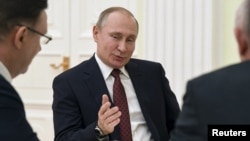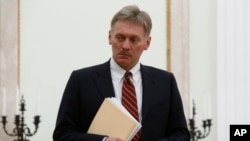With the results of Russia’s presidential elections now nearly a week old, Russia’s domestic political analysts and foreign observers alike have largely arrived at the same conclusion: The March 18 contest brought few surprises for Russians and Westerners alike.
While the Kremlin insists the elections were fair and transparent, a number of Russia’s leading political analysts are voicing concerns and predicting a succession crisis in the country in 2024, when Russian constitutional terms limits say Putin, now 65, will be ineligible to seek another consecutive term.
The Vienna-based Organization for Security and Cooperation in Europe (OSCE), which sent hundreds of election observers to monitor polling, said the election was conducted in an orderly fashion but lacked real choice. Putin Press Secretary Dmitry Peskov, however, said the results were highly significant — and that they speak for themselves.
“Elections that took place on March 18 demonstrated that our society is fully consolidated,” Peskov said in a statement to the press. “And it is not consolidated because of someone’s attacks, but, rather, thanks to the plans of further development of the country, which the election results demonstrated.”
Compared to Soviet elections
However, a number of Russian political scientists disagree with this assessment. Among them is Dmitry Oreshkin, a political scientist, journalist and the 2001 Person of the Year, according to the Rambler web portal — Russia’s largest.
“[Putin] won. What am I unhappy about? The elections resemble Soviet elections,” Oreshkin said in an interview with VOA’s Russian Service on Thursday.
“Firstly, there was no alternative to Putin,” he added, referring to the fact that although Putin won his fourth term, with 77 percent of the vote from a field of eight candidates, numerous news outlets have reported that his campaign was exempt from most election laws and restrictions.
“Similarly, Soviet ballots only had one name on them,” Oreshkin added. “Secondly, the electorate was [coerced into going] to the polls. People can’t risk taking a political stance. Their bosses tell them they need to go, so they go.”
No real transparency
Ekaterina Schulmann, senior lecturer in public policy at the Russian Presidential Academy of National Economy and Public Administration, said polling results reported by Kremlin officials lack any real transparency.
“One of the post-elections scandals [in Russia] is the statement of Russia’s internal affairs minister [Sergey Shoigu] that 99 percent of the military and their family members have voted, and 89 percent of those supported Russia’s commander-in-chief,” said Schulmann, who is also a host for Echo of Moscow radio. “That is crazy, because the military personnel vote at the same polls as everyone else — with the exception of military communities and military bases abroad — and there’s absolutely no way to know who they voted for. This makes this statement either deeply speculative or proof of fraud.”
Succession crisis?
As for Russia’s future, Kirill Rogov, a political expert and journalist who has championed Russian independent media, believes that the country will face an intractable succession crisis.
“Everything will be focused on what happens in 2024,” he told VOA. “The elites are going to find the succession issue unacceptable, because whoever Putin’s successor is, [this successor] would have to — despite staying loyal to Putin — reshuffle the elites in order to maintain power.”
Oreshkin challenged the notion of any succession within Putin’s lifetime, saying the former KGB spy will continue to lead the country in whatever capacity he sees fit, for as long as he sees fit.
“Who is going to be Putin’s successor? Putin himself. We don’t know yet in what capacity, whether he’ll be prime minister or the leader of a new state, but he’ll find it hard to leave,” Oreshkin said. “And each year it’ll only become harder.”
This story originated in VOA’s Russian Service.





